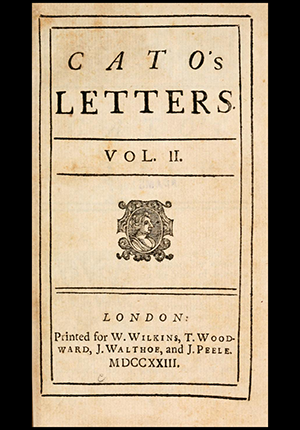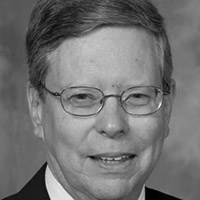Historic Document
Cato’s Letters (1720-23)
John Trenchard and Thomas Gordon | 1720-23

John Adams Library at the Boston Public Library
Summary
John Trenchard (1662-1723) and Thomas Gordon (1692-1750) were co-authors of Cato’s Letters (1720-23). Trenchard was a radical Whig. In the 1690s, during the Standing Army Controversy, he wrote two pamphlets with Walter Moyle: An Argument, Shewing that a Standing Army is Inconsistent with a Free Government (1697), and A Short History of Standing Armies in England (1698). In 1720 and 1721, he co-edited a weekly journal entitled The Independent Whig; and from 1720 to 1723, he co-authored the 144 letters published in the London Journal and the British Journal and subsequently collected in two volumes under the title Cato’s Letters. His collaborator in this effort was the much younger Scottish Whig named Thomas Gordon, who went on to publish discourses on and translations of the works of Sallust and Tacitus. In Whig circles in America, the two men were appreciated for their firm opposition against tyranny and stalwart support for republicanism. The Letters were widely read and cited in the American colonies and profoundly influenced the ideas and inspired the cause of the American revolutionaries.
Selected by

Paul Rahe
Professor of History and Charles O. Lee and Louise K. Lee Chair in the Western Heritage at Hillsdale College

Jeffrey Rosen
President and CEO, National Constitution Center

Colleen A. Sheehan
Professor of Politics at the Arizona State University School of Civic and Economic Thought and Leadership
Document Excerpt
Letter 15:
Without freedom of thought, there can be no such thing as wisdom; and no such thing as publick liberty, without freedom of speech: Which is the right of every man, as far as by it he does not hurt and control the right of another; and this is the only check which it ought to suffer, the only bounds which it ought to know. This sacred privilege is so essential to free government, that the security of property; and the freedom of speech, always go together; and in those wretched countries where a man cannot call his tongue his own, he can scarce call any thing else his own. Whoever would overthrow the liberty of the nation, must begin by subduing the freedom of speech; a thing terrible to publick traitors.
Freedom of speech is the great bulwark of liberty; they prosper and die together: And it is the terror of traitors and oppressors, and a barrier against them. It produces excellent writers, and encourages men of fine genius. Tacitus tells us, that the Roman commonwealth bred great and numerous authors, who writ with equal boldness and eloquence: But when it was enslaved, those great wits were no more. . . . Tyranny had usurped the place of equality, which is the soul of liberty, and destroyed publick courage. The minds of men, terrified by unjust power, degenerated into all the vileness and methods of servitude: Abject sycophancy and blind submission grew the only means of preferment, and indeed of safety; men durst not open their mouths, but to flatter.
Letter 62:
The entering into political Society, is so far from a Departure from his natural Right, that to preserve it was the sole Reason why Men did so; and mutual Protection and Assistance is the only reasonable Purpose of all reasonable Societies. To make such Protection practicable, Magistracy was formed, with Power to defend the Innocent from Violence, and to punish those that offered it; nor can there be any other Pretence for Magistracy in the world. In order to this good End, the Magistrate is intrusted with conducting and applying the united Force of the Community; and with exacting such a Share of every Man’s Property, as is necessary to preserve the Whole, and to defend every Man and his Property from foreign and domestick Injuries. These are the Boundaries of the Power of the Magistrate, who deserts his Function whenever he breaks them. By the Laws of Society, he is more limited and restrained than any Man amongst them; since, while they are absolutely free in all their Actions, which purely concern themselves; all his Actions, as a publick Person, being for the Sake of Society, must refer to it, and answer the Ends of it.
It is a mistaken Notion in Government, that the Interest of the Majority is only to be consulted, since in Society every Man has a Right to every Man’s Assistance in the Enjoyment and Defence of his private Property; otherwise the greater Number may sell the lesser, and divide their Estates amongst themselves; and so, instead of a Society, where all peaceable Men are protected, become a Conspiracy of the Many against the Minority. With as much Equity may one Man wantonly dispose of all, and Violence may be sanctified by mere Power.
And it is as foolish to say, that Government is concerned to meddle with the private Thoughts and Actions of Men, while they injure neither the Society, nor any of its Members. Every Man is, in Nature and Reason, the Judge and Disposer of his own domestick Affairs; and, according to the Rules of Religion and Equity, every Man must carry his own Conscience. So that neither has the Magistrate a Right to direct the private Behaviour of men; nor has the Magistrate, or any body else, any manner of Power to model People’s Speculations, no more than their Dreams. Government being intended to protect Men from the Injuries of one another, and not to direct them in their own Affairs, in which no one is interested but themselves; it is plain, that their Thoughts and domestick Concerns are exempted intirely from its Jurisdiction: In Truth, Mens Thoughts are not subject to their own Jurisdiction.
Idiots and Lunaticks indeed, who cannot take Care of themselves, must be taken Care of by others: But whilst Men have their five Senses, I cannot see what the Magistrate has to do with Actions by which the Society cannot be affected; and where he meddles with such, he meddles impertinently or tyrannically. Must the Magistrate tie up every Man’s Legs, because some Men fall into Ditches? Or, must he put out their Eyes, because with them they see lying Vanities? Or, would it become the Wisdom and Care of Governors to establish a travelling Society, to prevent People, by a proper Confinement, from throwing themselves into Wells, or over Precipices; Or to endow a Fraternity of Physicians and Surgeons all over the Nation, to take Care of their Subjects Health, without being consulted; and to vomit, bleed, purge, and scarify them at Pleasure, whether they would or no, just as these established Judges of Health should think fit? . . .
Let People alone, and they will take Care of themselves, and do it best; and if they do not, a sufficient Punishment will follow their Neglect, without the Magistrate’s Interposition and Penalties. It is plain, that such busy Care and officious Intrusion into the personal Affairs, or private Actions, Thoughts, and Imaginations of Men, has in it more Craft than Kindness; and is only a Device to mislead People, and pick their Pockets, under the false Pretence of the publick and their private Go[o]d. To quarrel with any Man for his Opinions, Humours, or the Fashion of his Clothes, is an Offence taken without being given. What is it to a Magistrate how I wash my Hands, or cut my Corns; what Fashion or Colours I wear, or what Notions I entertain, or what Gestures I use, or what Words I pronounce, when they please me, and do him and my Neighbour no Hurt? As well may he determine the Colour of my Hair, and controul my Shape and Features.
True and impartial Liberty is therefore the Right of every Man to pursue the natural, reasonable, and religious Dictates of his own Mind; to think what he will, and act as he thinks, provided he acts not to the Prejudice of another; to spend his own Money himself, and lay out the Produce of his Labour his own Way; and to labour for his own Pleasure and Profit, and not for others who are idle, and would live and riot by pillaging and oppressing him, and those that are like him.
So that Civil Government is only a partial Restraint put by the Laws of Agreement and Society upon natural and absolute Liberty, which might otherwise grow licentious: And Tyranny is an unlimited Restraint put upon natural Liberty, by the Will of one or a few. Magistracy, amongst a free People, is the Exercise of Power for the Sake of the People; and Tyrants abuse the People, for the Sake of Power. Free Government is the protecting the People in their Liberties by stated Rules: Tyranny is a brutish Struggle for unlimited Liberty to one or a few, who would rob all others of their Liberty, and act by no Rule but lawless Lust.




